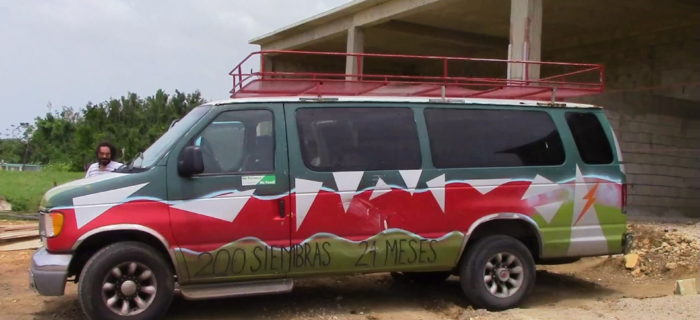Puerto Rican Farmer’s Movement Boricuá Wins US Food Sovereignty Prize
To view this article in Spanish, click here.
The Boricuá organization for ecological agriculture of Puerto Rico has been named the international honoree of this year’s Food Sovereignty Prize. Awarded by the US Food Sovereignty Alliance (USFSA), this year’s Prize is shared with the Black Mesa Water Coalition of Arizona.
Building on decades of work to re-establish agriculture and ensure food sovereignty on the island, Boricuá has been instrumental in ensuring the cultivation and delivery of food to Puerto Rico’s beleaguered population in the wake of Hurricane María. Nearly 3,000 people died as the result of the hurricane and the inability of the US Federal Government to restore basic services—including electricity, schools and health centers—in its aftermath. Within days of Maria’s landfall, Boricuá, mobilized with el Fondo de Resiliencia (Resiliency Fund) and other Puerto Rican organizations to clear roads, rebuild farms and deliver food (mostly root crops that survived the hurricane’s 140 mph winds) to desperate rural communities through a well-coordinated system of Food Sovereignty Brigades that mobilized people and supplies on the gaily-painted “Guagua Solidaria” (Solidarity Bus).
These grassroots relief activities have had an impact far beyond rebuilding Puerto Rico’s farming communities. I know, because 8 months after the storm I travelled to Puerto Rico with Leonor Hurtado of Food First and Miguel Altieri of SOCLA—The Latin American Scientific Society for Agroecology.
Boricuá invited us to hold a series of workshops on agroecological resilience and reconstruction. We expected to see an island in the throes of FEMA led reconstruction. What we found were diverse groups of farmers, neighborhood associations, chefs, community kitchens, university professors and students, all pulling together to rebuild their island.
In the absence of government reconstruction support, these Brigades formed extensive networks of mutual aid throughout Puerto Rican society. Farmers—both conventional and organic—were working together for sustainable reconstruction. Conventional farmers, organic farmers, permaculturists and agroecologists all showed up for the workshops on agroecological reconstruction at dairies and the remote small farms clinging to the steep hillsides of Puerto Rico’s mountainous interior, and at the student farm at the University of Puerto Rico in San Juan. The talk was technical, methodological and organizational, but it was also deeply political. The hurricane has not only brought diverse sectors together, it has politicized Puerto Rican society to a degree not seen since the radical independence movements of the 1970s.
Boricuá organized work brigades, workshops, conferences, radio spots, press conferences, and brought us to the 10th Annual Agroecology Symposium on the Utuado campus of the University of Puerto Rico. The government wants to close this rural campus—precisely when the countryside needs it the most—and we were humbled to see students, professors, farmers, and community members turn out to keep the campus open. The conversation was about agroecological reconstruction—and about food sovereignty for an island that imports over 90% of its food.
Stay in the loop with Food First!
Get our independent analysis, research, and other publications you care about to your inbox for free!
Sign up today!Puerto Rico, and the Puerto Ricans who are struggling to rebuild the island in the face of the abject neglect of the United States deserve recognition and solidarity. They are not only rebuilding roads, farms and schools, they are building a new society. In all respects, the US Food Sovereignty Prize is well deserved.
Cover Image by Leonor Hurtado: “Guagua Solidaria” (Solidarity Bus).


 Help Food First to continue growing an informed, transformative, and flourishing food movement.
Help Food First to continue growing an informed, transformative, and flourishing food movement.




